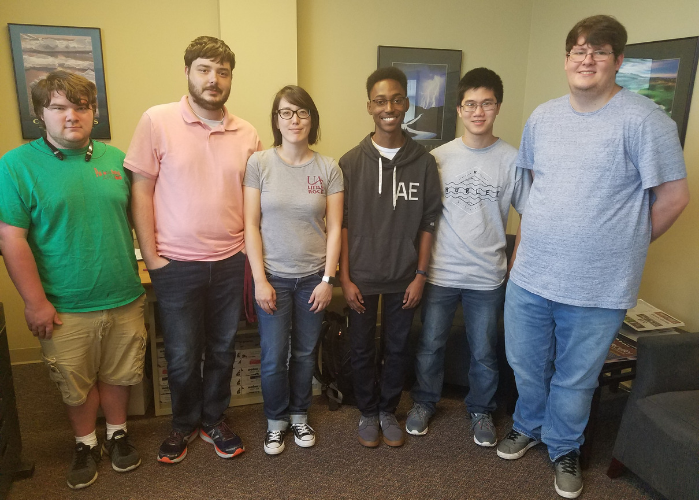UA Little Rock students reach hackathon finals
University of Arkansas at Little Rock student teams took two of the nine final spots at the UA BlockChain Hackathon at the University of Arkansas held Sept. 28-29.
The hackathon featured 21 teams from Arkansas colleges and universities and was sponsored by nine large businesses such as IBM, Tyson, Heifer International, and J.B. Hunt, who provided challenges focused on using BlockChain technology for teams to present during the competition. Each of the nine sponsors chose a team to advance to the finals where they presented their results against the winners of other challenges.
“BlockChain refers to a distributed database platform that allows for the secure processing and management of transactions across a network,” explained Dr. Liz Pierce, chair of UA Little Rock’s Department of Information Science. “It is the technology behind BitCoin and is also of great interest to companies like J.B. Hunt and Walmart who want to be able to track transactions across many different producers and suppliers.”
Two UA Little Rock teams, representing J.B. Hunt and ArcBest, each won in their challenges and presented their developments in the finals. All of UA Little Rock’s competitors were undergraduates with little to no prior BlockChain experience or knowledge, while most of their competition came from graduate students from the University of Arkansas’ BlockChain Center of Excellence.
Students Karen Watts, Michael DiCicco, and Brenda Nyangweso won J.B. Hunt’s challenge and went on to represent them in the finals, along with Aaron David, Brock Butler, Hunter Wright, Ian Thompson, and Sunny Singh from the ArcBest team.
An additional 25 more UA Little Rock students also took part in the competition: Thomas Emmerling, Naveed Siddiqui, Brenda Chepkorir, Yinqi Chen, Ryan Moore, Peter Israsena, Hengchang Liao, Nicholas Stewart, Zhenlin Jin, Kyle Hooks, Zachary Long, Bushra Sajid, Saba Khalid, Christopher Lewis, Brady Moore, Moteet Bakeman, Mughal Minhaj Uddin, Lucas Rayburn, Hitaxiben Patel, Donovan Valestin, Shibani Lal, Richard Young, Malik El-Amin, Christian Aqui, and Kristen Stewart.
Butler, a junior information science major from Hot Springs, and his team created a driver registration system for ArcBest with the goal of improving driver retention.
“For the use case, we chose to create a system that would bring in information from government, law enforcement, and independent company databases and api’s. We would store the information within ledgers that would be interconnected through a BlockChain, and that chain of ledgers would be sorted and rated by a neural network,” Butler said. “A neural network is basically a self-improving algorithm that would learn and adapt like the human brain. Our neural network would be able to pull up ledgers about and assign ratings towards the drivers within a mobile app that both drivers and employers could use. The mobile app would allow drivers to see in real-time how well they’re performing and it could become a tool for them to use when looking for a job, and because they could see how they’re doing in their current position.”
Watts, a senior information science major from Bryant, and her team, sudoIntellectual, created an electronic bill of lading system for J.B. Hunt that they named “Truck Hunt.”
“How does Truck Hunt work? When a carrier arrives at the shipper, as pallets are loaded into the truck, RFID or smart pallets can track what is loaded in the truck. Then the carrier gives a tablet to the shipper that then uses facial recognition to cryptographically sign the bill of lading. As the carrier goes from point A to point B, there are sensors in the truck that collect the temperature data, GPS, and acceleration,” Watts said.
“Once the carrier arrives at the receiver, the truck is unloaded and the receiver verifies that everything was arrived in order and they both cryptographically sign the bill of lading. At the point the pdf is finalized and the hash is stored on the blockchain. If there is a dispute then the data from the sensors is also stored on the BlockChain.” further explained Watts, who’s team has since been invited to present their project to J.B. Hunt’s executive committee.
Watts’ teammate Michael DiCicco, a junior information science major from Benton, credits UA Little Rock with providing him with the opportunity to travel, network, and compete at hackathons across the country.
“I’ve enjoyed getting to travel so much, and I’ve gotten to go everywhere from Las Vegas to Alabama,” DiCicco said. “It’s also helped me become a better communicator, and I always come back with good takeaways.”
Pierce and the rest of UA Little Rock’s information science faculty could not be more pleased with their students’ performance.
“I think it’s amazing that they went in and did so well against competitors with more experience than them, I’m always looking forward to what they’ll show us next!” she said.
Eight UA Little Rock students reached the hackathon’s finals, including (from L to R): Ian Thompson, Michael DiCicco, Karen Watts, Brock Butler, Aaron David, and Hunter Wright.
